i剑桥国际商务英语 unit 14 negotiations
- 格式:ppt
- 大小:1.68 MB
- 文档页数:33
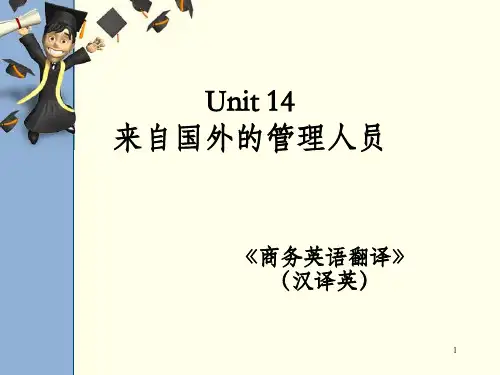
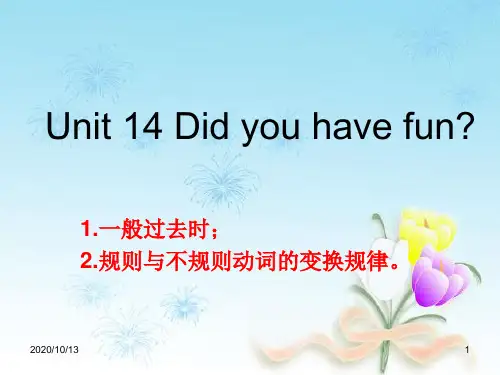
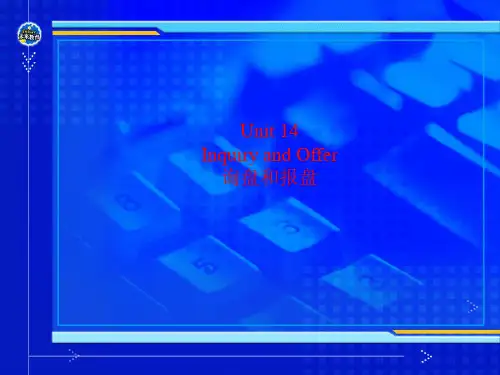
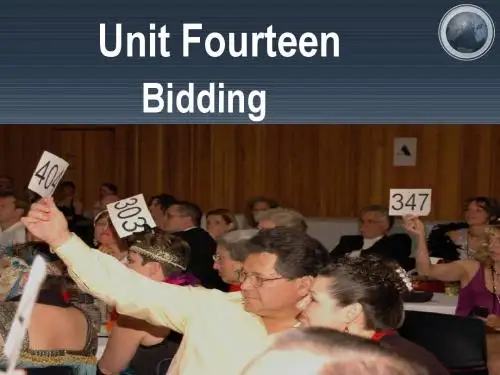
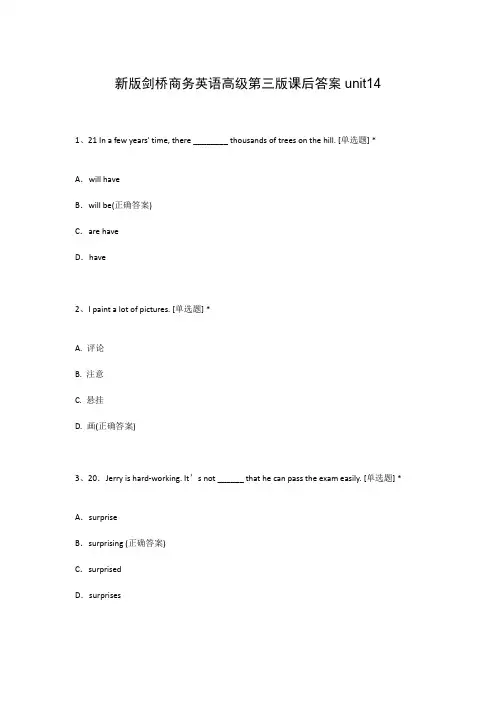
新版剑桥商务英语高级第三版课后答案unit141、21 In a few years' time, there ________ thousands of trees on the hill. [单选题] * A.will haveB.will be(正确答案)C.are haveD.have2、I paint a lot of pictures. [单选题] *A. 评论B. 注意C. 悬挂D. 画(正确答案)3、20.Jerry is hard-working. It’s not ______ that he can pass the exam easily. [单选题] * A.surpriseB.surprising (正确答案)C.surprisedD.surprises4、52.I'm happy to ________ a birthday card from an old friend. [单选题] *A.buyB.makeC.loseD.receive(正确答案)5、—Do you like to watch Hero?—Yes. I enjoy ______ action movies. ()[单选题] *A. watchB. watching(正确答案)C. to watchD. watches6、19.Students will have computers on their desks ________ . [单选题] *A.in the future(正确答案)B.on the futureC.at the momentD.in the past7、It is reported that the fire caused serious()to that school building. [单选题] *A. damage(正确答案)B. destroyC. harmD.hurt8、16.Lily is a lovely girl. We all want to ________ friends with her. [单选题] * A.haveB.make(正确答案)C.doD.take9、Jeanne's necklace was _____ 500 francs at most. [单选题] *A. worthyB. costC. worth(正确答案)D. valuable10、I?have to?_______ my younger brother on Sunday. [单选题] *A. look after(正确答案)B. look upC. take careD. look out11、We are very hungry now. Can you _______ us something to eat? [单选题] *A. carryB. takeC. borrowD. bring(正确答案)12、He made ______ for an old person on the bus. [单选题] *A. room(正确答案)B. roomsC. a roomD. some rooms13、His new appointment takes()from the beginning of next month. [单选题] *A. placeB. effect(正确答案)C. postD. office14、David ______ at home when I called at seven o’clock yesterday evening. ()[单选题] *A. didn’tB. doesn’tC. wasn’t(正确答案)D. isn’t15、You might not like the way Sam behaves, but please be kind to him. _____, he is your grandfather. [单选题] *A. After all(正确答案)B. Above allC. In allD. At all16、The relationship between employers and employees has been studied(). [单选题] *A. originallyB. extremelyC. violentlyD. intensively(正确答案)17、Guilin is _______ its beautiful scenery. [单选题] *A. famous for(正确答案)B. interested inC. fond ofD. careful with18、Jim, we have _______ important to tell you right now . [单选题] *A. someB. something(正确答案)C. anyD. anything19、_____ whether robots will one day have vision as good as human vision. [单选题] *A. What is not yet knownB. It is not yet known(正确答案)C. As is not yet knownD. This is not yet known20、Tom didn’t _______ his exam again. It was a pity. [单选题] *A. winB. pass(正确答案)C. beatD. Fail21、In 2019 we moved to Boston,()my grandparents are living. [单选题] *A. whoB. whenC. where(正确答案)D. for which22、Is there going to ______ a football match in the stadium next month?()[单选题] *A. beingB. haveC. be(正确答案)D. having23、I arrived _____ the city _____ 9:00 am _______ April [单选题] *A. at, in, atB. to, on, atC. in, or, atD. in, at, on(正确答案)24、--_______ do you have to do after school?--Do my homework, of course. [单选题] *A. What(正确答案)B. WhenC. WhereD. How25、9.There will be a lot of activities at English Festival nest month. Which one would you like to ________? [单选题] *A.take part in (正确答案)B.joinC.attendD.go26、Three ______ died of water pollution last winter. [单选题] *A. hundreds of villagersB. hundred villagers(正确答案)C. hundreds villagersD. hundred of villagers27、—______ do you play basketball?—Twice a week.()[单选题] *A. How often(正确答案)B. How muchC. How manyD. How long28、Many young people like to _______ at weekends. [单选题] *A. eat out(正确答案)B. eat upC. eat onD. eat with29、My sister _______ listen to music when she was doing her homework.[单选题] *A. used to(正确答案)B. use toC. is used toD. uses to30、9.—Will there be more cars in the future?—________. [单选题] *A.See youB.Well, I'm not sure(正确答案)C.You're welcomeD.Thank you。
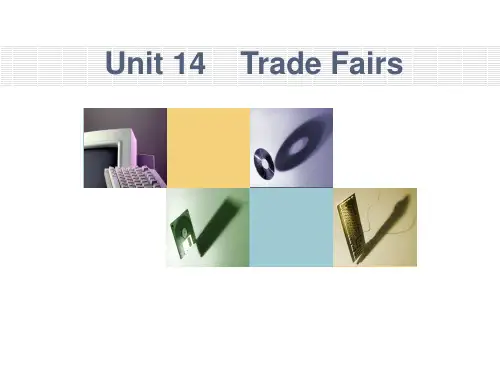

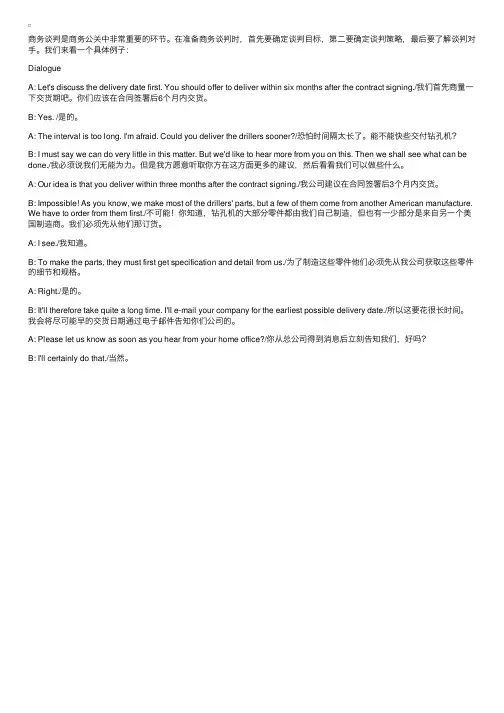
商务谈判是商务公关中⾮常重要的环节。
在准备商务谈判时,⾸先要确定谈判⽬标,第⼆要确定谈判策略,最后要了解谈判对⼿。
我们来看⼀个具体例⼦:DialogueA: Let's discuss the delivery date first. You should offer to deliver within six months after the contract signing./我们⾸先商量⼀下交货期吧。
你们应该在合同签署后6个⽉内交货。
B: Yes. /是的。
A: The interval is too long. I'm afraid. Could you deliver the drillers sooner?/恐怕时间隔太长了。
能不能快些交付钻孔机?B: I must say we can do very little in this matter. But we'd like to hear more from you on this. Then we shall see what can be done./我必须说我们⽆能为⼒。
但是我⽅愿意听取你⽅在这⽅⾯更多的建议,然后看看我们可以做些什么。
A: Our idea is that you deliver within three months after the contract signing./我公司建议在合同签署后3个⽉内交货。
B: Impossible! As you know, we make most of the drillers' parts, but a few of them come from another American manufacture. We have to order from them first./不可能!你知道,钻孔机的⼤部分零件都由我们⾃⼰制造,但也有⼀少部分是来⾃另⼀个美国制造商。
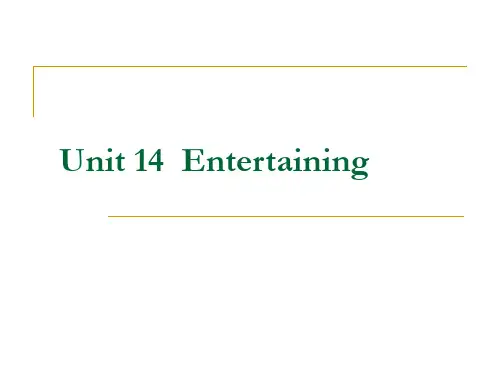
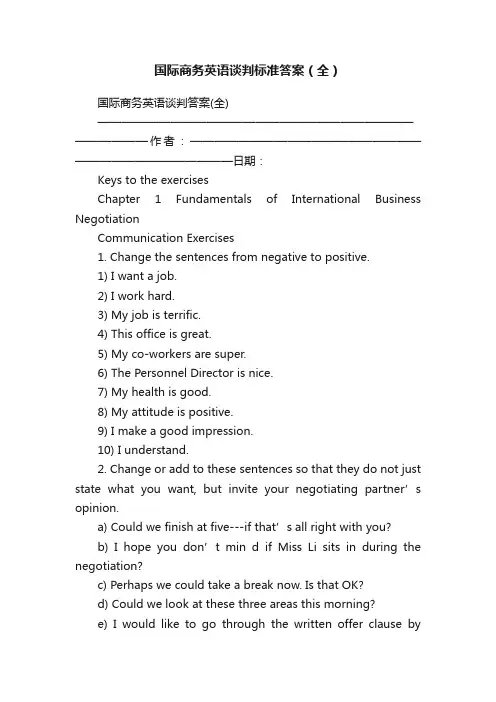
国际商务英语谈判标准答案(全)国际商务英语谈判答案(全)————————————————————————————————作者:————————————————————————————————日期:Keys to the exercisesChapter 1 Fundamentals of International Business NegotiationCommunication Exercises1. Change the sentences from negative to positive.1) I want a job.2) I work hard.3) My job is terrific.4) This office is great.5) My co-workers are super.6) The Personnel Director is nice.7) My health is good.8) My attitude is positive.9) I make a good impression.10) I understand.2. Change or add to these sentences so that they do not just state what you want, but invite your negotiating partner’s opinion.a) Could we finish at five---if that’s all right with you?b) I hope you don’t min d if Miss Li sits in during the negotiation?c) Perhaps we could take a break now. Is that OK?d) Could we look at these three areas this morning?e) I would like to go through the written offer clause byclause, if that’s OK?f) Do you mind if I answer your questions at the end?3. What is meant by “negotiation”? How would you define “negotiation”?A negotiation is a meeting in which both parties need each other’s agreement toreach a specific objective. It is the mechanism by which people trade things of value in a civilized manner. Negotiation depends on communication. It occurs between individuals acting either for themselves or as representatives of organized groups. Negotiations are very much part of working and home life.Negotiations could be either internal or external, long or short, formal or informal. The goal of negotiation is not to win but to succeed. The mechanism of successful negotiation is collaboration.In negotiations, both parties should know----why they negotiate----who they negotiate with----what they negotiate about----where they negotiate----when they negotiate----how they negotiatemechanism [ ] n.---- a process by which something is done or comesinto being途径4. Fill in the blankshuman, negotiable, interest, giving, trust5. Answer the following questions1) Physical or survival needs; Security and safety needs;Social needs; Ego oresteem needs; Self-realization needs2) Exploration, bidding, bargaining, settling and ratifying.6. Put the following into English1) Are you negotiable?2) I'm sure there is some room for negotiation.3) Before we have anything to negotiate, you have to make me an offer.4) We could add it to the agenda.5) Would anyone like something to drink before we begin?6) See what I can do.7) I would if I could.8) I know I can count on you.9) We'll come out from this meeting as winners.10) I'll try to make you happy.7. True or false1) T 2) T 3) T 4) F (Everything is negotiable.)5) F (bargaining stage)6) F ( Do not often. Sometimes they will follow the sequence n one aspect of thedeal and then start all over again on a second aspect.)7) T8) F (May not. Because either side may be wiling to say what it thinks or take aposition and stick to it )9) T 10)Negotiation skills1.What determines a success in negotiation? Success in negotiation is when the parties to the negotiation reach anagreement to which they are both committed and which they will implement in full.committed [ ] v.----尽责的implement [ ●??] v.----to put into practical effect; carry out使生效;执行2. What are the elements of a successful negotiation process?There are seven basic elements that should be considered when analyzing the negotiation process:a.The relationship among the parties.b.The parties' interests -- why they need to reach their stated objectivesc.An understanding of the choices available if the parties cannot reachagreement, often called their BATNA -- Best Alternative To a Negotiated Agreementd.Creativity which will expand the bargaining choices among which the partiescan choose to reach agreemente.Fairness -- a person who negotiates unfairly may be able to force an agreement,but the 'forced' party will be reluctant to fulfill their share of the agreementf.Whether commitment has been reached. Will the parties each feel committedto doing what they have agreed? Is each party capable of fulfilling their share of the deal?g.Negotiation is all about communicating information. If one party knowseverything then why do they need to negotiate with anyone else?And the foundation of good negotiation is preparation. Be prepared and thenegotiation will bring a result that really works. If well prepared you are lessvulnerable to surprise, and that increases the likelihood you'll be happy with the result.vulnerable [ ??●●] adj.----易受攻击的, 易受...的攻击3. Your client comes into your office and is exceedingly grumpy and difficult to talk to. How do you approach your client so as to make your meeting as productive as possible?Answer: (e)When the client is grumpy, their emotions will inevitably cloud their judgment and make it difficult to interact with them on substantive matters. At the same time, if they are experiencing anger, it is important to ensure them that we understand that they are upset. By acknowledging the client's anger and offering our assistance, the client will feel as though we are on the "same side" and treat us as friends and continue to direct their anger elsewhere- allowing us to focus on the substantive issues.substantive [ ] adj.----of or relating to the essence 实质的Chapter 2 Proper Behaviors in International Business Negotiation Communication Skills1. What would you say if…a.Thank you./No, after you.b.Thanks. I’ll need it.c.Thank s. That’s very kind.d.Thanks for coming all the way.e.Thanks for helping. That was very kind of you.f. Thank you for thinking of me, but I’m afraid I can’t take it.2. Answer the following questions.(1) Only about half of what he or she heard(2) Not only does note taking force you to listen carefully, but it alsopsychologically throws the speaker off the balance when he or she sees you nodding and furiously writing away and having a record of all the facts and basically everything said. A further benefit of note taking is that you have the perfect excuse to avoid eye contact if you are afraid to reveal your reactions to someone’s proposals(3) Questions appear to be able to be divided into five basic functions:①Cause attention.②Get information.③Giv e information.④Start thinking.⑤Bring to conclusion.(4) There are two ways to assure a high degree of reliability for answers to yourquestions. One way is to lay the foundation for asking them. The second is through the use of the tactic called “bipolar questioning.”(5) A firm handshake gives the impression of quiet confidence and says that thisperson is glad to meet you.3. Choose the best answer.(1) D (2) C (3) B (4) A (5) (6) D (7) B (8) C (9) A (10)A4. Translate the following into English.(1) Th ere’s a great demand for our new product.(2) This product has good prospects.(3) We need to talk about the basic terms of the transaction.(4) If your prices are reasonable and the quality is satisfactory, we shall placesubstantial orders with you.(5) It’s unwise for both of us to insist on his own price. Can we each make someconcession?(6) If y ou cannot reduce your price, we’d rather call the whole deal off.(7) If you want to expand your business in this market, you have to take flexibleways in adopting payment terms.(8) We regret that we cannot accept your demand for direct shipment.(9) This product has many advantages compared to other competing products.(10)I’m very glad that we have finally come to an agreement. We’ll go on toother terms and conditions tomorrow. Is it all right with you?5. True or false.(1) F (2) T (3) F (4) T (5) F (6) T (7) F (8) F (9) F (10) TNegotiation Skills1. The person you are negotiating with continually repeats the same argument despite the fact that you have given them a number of counterarguments. What do you do to move the negotiation forward?Answer: (a)One of the most powerful tools in negotiation is how to listento what the other party is saying. Very often, we are too focused on the points we are trying to get across to listen to what our counterparts are trying to say.If people keep repeating themselves, they are subconsciously sending a signal that they feel what they are saying is important. And they want us to acknowledge that we have heard and understand them.Accordingly, the best thing to do in this situation is to rephrase what they keep repeating and ask them if we have accurately restated their point. Only when they feel as though they have been heard will they be able to listen to usEffective listening involves much more than simply hearing and understanding what the counterpart is saying. Effective listening is a set of tools and techniques which expert negotiators use to gain control of the negotiation and turn it to their advantage.2. What are the key communication skills used in negotiation?The key communication skill in negotiation is to listen. There's an old saying: God gave us one mouth and two ears, and we should use them in that ratio.Obviously when we are listening, we need to be listening for useful information. Thus it is very important to plan ahead, thinking about what we can learn that will help us decide what approach to take and to learn about what appeals to the parties with whom we are negotiating. So think about the questions you're going to ask; the result should reward your listening with real problem-solving information.Chapter 3 Choosing the Negotiation TeamCommunication Exercises1. What is the more indirect question or statement behindthe following sentences?a. I’m not entirely convinced by these forecasts.b.We’d like to know something about your planning.c.I’d be interested to hear a bit about payment.d.Your costs could cause one or two problems.e.Perhaps we could talk a little bit about figures.f.That figure looks a little on the high side.g.Delivery is an area which we’d like to explore a little further with you.h.I’d like to know more about your management structure.1.Write the name of the position in the blank.1) CEO/the president2) Assistant Manager, Europe3) Purchasing Clerk4) Personnel Assistant5) Vice-President, Administration3. (omitted)4. (omitted)5. Fill in the blanks1)maximum2) observers; advisers; speaking; training6. Translate the following into English1)Negotiation is a team sport.2)The negotiator’s function is to negotiate, while the functional specialists provide specialist advice or information.3) The team leader is the person who generates enthusiasm in his team tomaintains the morale under all conditions.4) The team members must learn that the opponent and its representatives areadversaries although they may be friendly.5)I’m afraid you are not in our ballpark.6) Excuse me, but it seems to me we’re giving up too much in this case.7)That’s too great a financial bu rden for us.8) 10% is beyond my negotiating limit.9)If you can guarantee that on paper, I think we can discuss this further.10)Could you explain what you mean by that?7. True or false1). F 2). T 3). T 4). F (maximize) 5). T 6). F (can’t)7). F (both sides) 8). T 9). T 10). F (There is no need to )Negotiation skills1. What do you think are the personal qualities of a good negotiator?A good negotiator needs to be:1) A good listener2)Open-minded3)Willing to do the homework to determine her/his interests, objectives,and alternatives4)Well-prepared5)Creative6)Able to merge what he knows about his own interests and resourceswith the interests and resources of his negotiation partner7)Someone who is always learning from experience, from other peopleand from historymerge [] v. ----to combine or unite 使合并或结合2. How to be a cool negotiator?Acting cool is a good part of successful negotiation. But one needs to make sure it is not just an act. The 'coolness' needed for successful negotiation really means keeping a cool analytical head. If there is any chance one shouldprepare ahead of time: what do I want and why do I want it? What do theywant and why do they want what they want?During the process, one should find ways to take a step back from the discussion and look at what is going on with that same cool head. 'Why did he say that? What arguments or tactics are being used?3. How to control anger for effective negotiating?When tempted to get angry, remember to check whether or not it is your turn. If it is someone else's turn to get angry, sit there and take it by reminding you how wonderful you are to be in such control of your emotions.One fundamental rule is: only one person can be angry at a time. Don't let thesituation escalate, civility will slip away awfully quickly and there will be a very tough time healing the relationship or solving the initial issue.civility [●???] n. ----a courteous act or utterance有礼貌的举止或表达4. What are the advantages and disadvantages of team negotiations?Negotiating as part of a team requires very careful preparation. The biggestdanger in team negotiation is that your counterparts will see or hear that you and your colleagues don't agree with each other.If they can find differences, theymay spot opportunities to drive wedges between your team members.wedge [] n.----something that intrudes and causes division or disruption侵入引起分裂的东西Teams can work together ahead of time on strategy: who is going to be thespokesperson on which issues? What information do we need and who is going to ask the relevant questions? Who can communicate what decisions to the 'other side'? What members of the team are the experts on technical matters, business matters, etc.?But even if a group of colleagues work hard at developing a commonly agreed strategy you will find that, there is still a risk that someone will say something out of turn or which is not part of his role. They need to explore how to cope with such problems during the actual negotiation.Individual negotiations have certain other advantages: the negotiator can present him/herself as the decision-maker or as the spokesperson for their company or colleagues. This gives the individual negotiator considerable flexibility that may not be available in team negotiation situations.Chapter 4 Preparing for NegotiationCommunication Exercises1. What would you say in these situations?1) Mrs Zhang, I’d like you to meet Tracy Morris. She’s our new sales clerk.2) Hello, Kathy. Nice to meet you.3) That’s right. Ye s, we once worked together in.4) I’m terribly sorry. I’ve forgotten your name.5) Yes, good morning. My name is … I’ve got an appointment with…6) Did you have a good journey? It’s very nice of you to come all this way.7) Would you like a coffee? Or Would you like something to drink?8) Good heavens, is tha t the time? I didn’t realize it was so late. I really must begoing now.2. Make these sentences more concise1) He’s an assistant in Personnel.2) She’s the Vice-President in Sales and Marketing.3) H e’s the Assistant Manager in Domestic Sales.4) She’s the Manager in International Sales.5) He’s an accountant in Accounting.3. Combine these sentences as concise as possible1) She is a clerk in Purchasing at ABC Company.2) He’s a salesman in the Asian Pacific Division at Sun Computer Company.3) She’s t he Manager of Domestic Sales at Legend Group.4) He’s a secretary in Personnel at Huatian Hotel.。
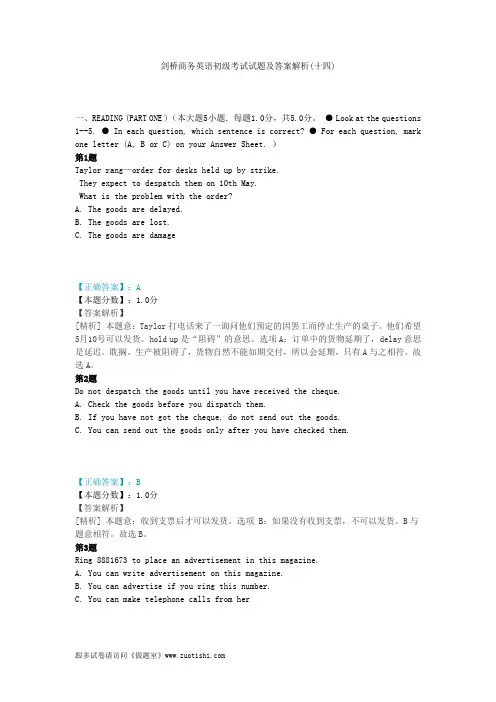
剑桥商务英语初级考试试题及答案解析(十四)一、READING (PART ONE )(本大题5小题.每题1.0分,共5.0分。
● Look at the questions 1--5. ● In each question, which sentence is correct? ● For each question, mark one letter (A, B or C) on your Answer Sheet. )第1题Taylor rang—order for desks held up by strike.They expect to despatch them on 10th May.What is the problem with the order?A. The goods are delayed.B. The goods are lost.C. The goods are damage【正确答案】:A【本题分数】:1.0分【答案解析】[精析] 本题意:Taylor打电话来了一询问他们预定的因罢工而停止生产的桌子。
他们希望5月10号可以发货。
hold up是“阻碍”的意思。
选项A:订单中的货物延期了,delay意思是延迟、耽搁。
生产被阻碍了,货物自然不能如期交付,所以会延期,只有A与之相符。
故选A。
第2题Do not despatch the goods until you have received the cheque.A. Check the goods before you dispatch them.B. If you have not got the cheque, do not send out the goods.C. You can send out the goods only after you have checked them.【正确答案】:B【本题分数】:1.0分【答案解析】[精析] 本题意:收到支票后才可以发货。
国际商务谈判英文版第三版篇一:国际商务谈判英文版第三版Chapter 1Negotiation Motives and Key Termin ology(谈判动机与关键概念)Negotiatio(谈判)Conflicts(冲突)Stakes(利益得失)Case Study:Chrysler Missed the Best Opportunit y Entering ChinaAutomobile Market(案例研究:克莱斯勒公司错失进入中国汽车市场良机) Chapter 2Negotiation Procedure and Structure(谈判程序与结构)Negotiation Procedure(谈判程序)General Structure of Negotiatio(谈判的一般结构)Structure of Business Negotiatio(贸易谈判结构)Simulation:An Economic Recession(模拟谈判:一次经济衰退)Case Study I:The Principle of Complementary Con cession(案例研究Ⅰ:对等性让步原则)Case Study II:Sino-US Negotiatio on Intellectual Property Right Protection(案例研究Ⅱ:中美知识产权谈判)Chapter 3 Negotiation Lubrication(谈判润滑剂)Target Decision(设定谈判目标)Collecting Information(信息调研)Staffing Negotiation Teams(配备谈判组成员) Choice of Negotiation Venues(谈判地点的确定)Simulation:Silk Selling(模拟谈判:丝绸销售) Case Study:Cases Showing Importance of Pre-ne gotiation Preparation(案例研究:谈判前准备工作的重要性)Chapter 4 Win-win Concept(双赢原则) Traditional Concept(传统理念)Introduction of Win-win Concept--a&nbs p;Revolution in Negotiation Field(赢一赢理念的引入——谈判界的一场革命)How Can Both Sides win(怎样实现双赢)Simulation:Financial Leasing Negotiation (模拟谈判:融资租赁谈判)Case Study:Argument between the Developing C ountries andDeveloped Countries(案例研究:发展中国家与发达国家的争论)Chapter 5 Collaborative Principled Negotiation(合作原则谈判法)Collaborative Principled Negotiation and Its Four Components(合作原则谈判法及其四个组成部分)Separate the People from the Problem(对事不对人)Focus on Interests But Not P ositio(着眼于利益而非立场)Invent Optio for Mutual Gain(创造双赢方案)Introduce Objective Criteria(引入客观评判标准) Simulation:Hotel Selling(模拟谈判:旅馆销售) Case Study:Company Policy(案例研究:公司政策)Chapter 6 Law of Interest Di stribution(利益分配法则)Needs Theory(需求理论)Application of the Needs Theory& nbsp;in Negotiation(需求理论在谈判中的应用)Three Levels of Interests at t he Domestic Level(国内谈判的三层利益)Law of Two-Level Game(双层游戏规则) Simulation:A Dam on the River(模拟谈判:河上建坝纠纷)Case Study:US-Japan Negotiatio on Semiconducto (案例研究:美日半导体谈判)Chapter 7 Negotiating Power and& nbsp;Related Facto(谈判力及相关因素) Negotiating Power and Sources of Negotiating Power(谈判力及谈判力的来源)Facto Causing the Changes of&n bsp;Negotiating Power(影响谈判力变化的因素)Application of Power Tactics(谈判力策略的应用)Estimating Negotiating Power(测量谈判力) Simulation:Negotiation on Oil Contract (模拟谈判:石油合同谈判)Case Study:Law—a Source of Negotiating Power (案例研究:法律——谈判力的一个来源)Chapter 8 Law of Trust(信任法则) Trust and Its Interpretation(信任及其解释)How to Decide a Pe on Tru sts or Is Trusted?(怎样决定一个人信任他人或者被别人信任) Determinants Affecting a Pe on”s Trustful or Mistrustful Behavior(影响一个人信任或不信任行为倾向的决定因素)Effects of Trust(信任的效应)Suggestio of Enhancing Mutual T rust(如何增进相互信任)Simulation:Market Research for a New Pr oduct(模拟谈判:新产品的市场调研)Case Study:Dilemma of the Management(案例研究:经理层的尴尬)Chapter 9 Pe onal Styles vs.Neg otiation Modes(谈判者性格类型与谈判模式)Negotiato “ Pe onal Styles(谈判者的性格类Negotiato “ Pe onal Styles and A C Model(个人性格类型与AC模型)Pe onal Styles vs.Negotiation Modes (性格类型与谈判模式)Application of Pe onality Checks(性格测试在谈判中的应用)Simulation:Global Corporation VS.Hi—tech Corporat ion(模拟谈判:全球公司与高科技公司)Case Study:Shopping in Manhattan (案例研究:在纽约曼哈顿购物)Chapter 10Game Theory and Negotiation Applic ation(博弈论及其在谈判中的应用)Game Theory,Its Assumptio and Rules(博弈论及其基本假设和规则)Co equences and the Matrix Displ(结果和矩阵排列)The Prisoner”s D ilemma(囚徒困境)Direct Determinants of the Coordin ation Goal(合作目标的直接决定因素)Simulation:China and Japan in Iron 0re&n bsp;Negotiation(模拟谈判:中国与日本铁矿石谈判中的博弈)Case Study:Making a Decision under Uncertainty (案例研究:不确定条件下的决策)Chapter 11 Distributive Negotiation  ;and Price Negotiation(两分法谈判与价格谈判)Distributive Negotiatio(两分法谈判)Price Negotiation and Negotiation Zone(价格谈判和谈判区间)Simulation:Sales for a Second-hand Car(模拟谈判:二手车销售)Case Study:An Example of the Use of&nb sp;Cost Analysis(案例研究:一个运用成本分析法的例子)Chapter 12 Complex Negotiatio(复杂谈判)Complex Negotiatio and Their Pr operties(复杂谈判及其特点)Involvement of Third Parties(第三方的参与)Coalition,Multi—party Negotiation(多方参与的谈判和谈判联合体)Simulation:Green Bank(模拟谈判:格林银行) Case Study:Iacocca Rescuing Chrysler (案例研究:艾柯卡拯救克莱斯勒公司)Chapter 13Culture Patter vs.Negotiation Patter(文化模式与谈判模式)Definition of Culture(文化的定义)Culture Patter(文化模式)Hofstede Cultural Value Study(霍夫斯泰德的文化价值研究)Simulation:Cultural Conflicts in the Negotiation of the World Bank Rural&nbs p;Water Supply Project(模拟谈判:世界银行改水项目谈判中的文化冲突)Case Study:Southern Candle”s Tour to France (案例研究:南部蜡烛公司的法国之行)篇二:国际商务谈判英文版第三版 However, some nego-tiators do not want to give up easily because the failure of the negotiation means neithercan have their interests realized. There can be another way Out. negotiating partiesmake efforts and explore alternatives to the options put forward before. A capable nego-tiator can always exhibit great initiatives and high ability by coming up with new op-tions and constructive suggestions which show the concern to the interests of both pari-ties. Quite often the final agreement of negotiations is reached based on several options. Roger Fisher and William Ury put forward an idea of “best alternative to a negotia-ted agreement (BATNA)” in their work Getting to Yes--Negotiating Agreement with-out Giving in. BATNA refers to your last choice between the conditions of the otherside and the opportunity for other better results. An example can help understand thepoint better. When you feel dissatisfied with your present salary and want to ask yourboss to raise your salary, what do you hope to put in your pocket? Is it a gun or a joboffer from another company that is a strong competitor to your present company? To find a BATNA is not an easy task. It requires a lot of investigation, considera-tion and comparison between your own options and options of other parties. Researchshows most of negotiators are ignorant of the importance of BATNA because they areoveroptimistic and overconfident. In fact most of important negotiations can not find asolution from one option. Negotiations without alternative options often end with failure. The following is an example of how to make an assessment of BATNA. Step One: Brainstorm alternatives. Assuming that a company is negotiating withits overseas distributor on commission fee. The negotiator should brainstorm to gener-atealternatives if the overseas distributor refuses to accept 6% commission on sales.The alternatives should be realistic and based on reliable information. The negotiatormay consider distributing in the overseas market through a home-based company. Asecond one may be to utilize the Internet to participate in the overseas market. A thirdalternative may be to increase the commission of the distributor.书摘()版权页: However, some nego-tiators do not want to give up easily because the failure of the negotiation means neithercan have their interests realized. There can be another way Out. negotiating partiesmake efforts and explore alternatives to the options put forward before. A capable nego-tiator can always exhibit great initiatives and high ability by coming up with new op-tions and constructive suggestions which show the concern to the interests of both pari-ties. Quite often the final agreement of negotiations is reached based on several options.Roger Fisher and Will iam Ury put forward an idea of “best alternative to a negotia-ted agreement (BATNA)” in their work Getting to Yes--Negotiating Agreement with-out Giving in. BATNA refers to your last choice between the conditions of the otherside and the opportunity for other better results. An example can help understand thepoint better. When you feeldissatisfied with your present salary and want to ask yourboss to raise your salary, what do you hope to put in your pocket? Is it a gun or a joboffer from another company that is a strong competitor to your present company?To find a BATNA is not an easy task. It requires a lot of investigation, considera-tion and comparison between your own options and options of other parties. Researchshows most of negotiators are ignorant of the importance of BATNA because they areoveroptimistic and overconfident. In fact most of important negotiations can not find asolution from one option. Negotiations without alternative options often end with failure. The following is an example of how to make an assessment of BATNA.Step One: Brainstorm alternatives. Assuming that a company is negotiating withits overseas distributor on commission fee. The negotiator should brainstorm to gener-ate alternatives if the overseas distributor refuses to accept 6% commission on sales.The alternatives should be realistic and based on reliable information. The negotiatormay consider distributing in the overseas market through a home-based company. Asecond one may be to utilize the Internet to participate in the overseas market. A thirdalternative may be to increase the commission ofthe distributor.作者简介() 白远,教授,硕士生导师,现任教于北京第二外国语学院国际经济贸易学院,主讲国际商务谈判、当代世界经济、国际贸易和国际经济合作等课程(前三门为全英语授课)。
CATALOGUEThe General Overview on International Business NegotiationThe General Procedures of International Business NegotiationFive Links of International Business NegotiationCross-Cultural Problems in International Business NegotiationBasic Qualities for NegotiatorsSome Styles in International Business NegotiationTactical Expressions in Business NegotiationPreparation for ExportingPreparation for NegotiationBusiness Negotiation IBusiness Negotiation IIBusiness Negotiation IIIBusiness Negotiation IVAfter the NegotiationChapter Onee GTheneral Overview on International Business NegotiationAn Overall Framework of International Business NegotiationFeatures of International Business NegotiationBasic Rules of International Business NegotiationStock PhrasesSome Tips for Trade Delegation1.What is Negotiation?The word “negotiation” derives from the Latin Infinitive “negotiari”(做贸易或生意)which means “to trade or do business”. This word itself is from another word, “negare”(拒绝), meaning “ to deny” and a noun, otium(休闲), meaning “leisure”. Thus , the ancient Roman businessperson would “deny leisure” until the business has been settl ed. Negotiation is a common human activity as well as a process that people undertake everyday to manage their relationships such a buyer and a seller, a husband and wife, children and parents. As the stakes in some of these negotiations are not very high, people need not have to get preparations for the process and the outcome. But in international business negotiations, the stakes are usually high, people cannot ignore this fact, they have to get preplans in a more careful way. Both parties in this kind of negotiation should contact each other so that they can get a better deal rather than simply accepting or rejecting what the other is offering. The whole process of negotiation is based upon the premise that both parties are interdependent, that is, one side cannot get what he/she wants without taking the other into consideration. In the process of negotiation, there are no rules, tradition, rational methods or higher authorities available to resolve their conflict once it crops up. Negotiation is a voluntary process of giving and taking where both parties amend their offers and modify their expectations so as to come closer to each other and they can quit, at any time.2. Why do People Negotiate?Negotiation is at the heart of every transaction and, for the most part, it comes down to theinteraction between two sides with a common goal (profits) but divergent methods. These methods (the details of the contract) must be negotiated to the satisfaction of both parties. As we will see later that it can be a very trying process that is full of confrontation and concession. Whether it is trade or investment, one party will always arrive at the negotiation table in a position of greater power. That power ( the potential for the profits ) may derive from the extent of the demand or from the ability to supply. The purpose of negotiation is to redistribute that potential. There is no such thing as “to take it or leave it” in international business. In fact, everything is negotiable. It all depends on the expertise of the negotiators.3. An Overall Framework of IBNInternational business negotiation (IBN) is a consultative process between governments, trade organizations, multinational enterprises, private business firms and buyers and sellers in relation to investment and import and export of products, machinery and equipments and technology. Negotiation is one of the important steps taken towards completing import and export trade agreements.To reach the desired results, the negotiators must seriously carry out the relative trade policies of their own countries. They should have good manners and speak fluent English. They should have a profound knowledge of professional technology and international markets. They should know the specifications, packing, features and advantages of the products and be able to use idiomatic and professional terms. In general, an overall framework of international business negotiation cover the following aspects: background factors, the atmosphere and the process.3.1 Background factors refer to objectives, environment, markets position, third parties and negotiators. They influence the process of negotiation and the atmosphere in a positive or negative way. Objectives mean what each side desires to achieve in the end. They are common, conflicting or complementary interests in both sides‟ wanting a successful transaction to take place; their interests conflict as profit to one is cost to the other; and complementary interest brings them together. Common and complementary objectives leave direct and positive effects while conflicting objectives have negative ones on the negotiation process. Environment here is defined as the political, social and structural factors related to both parties. It often hinders the process in international negotiation. Political and social aspects can affect the process whereas market structure does the atmosphere. The market position of the parties involved plays a leading role in the negotiation process. The third parties such as governments, brokers, consultants and so on may influence the process with their own objectives. Negotiators affect the negotiating process by means of their own experience and negotiating skills.3.2 The atmosphere is of great importance to the whole process of the international business negotiation. The atmosphere and the process influence each other at each stage. Atmosphere refers to the perceived “milieu”(氛围) around the interaction, how each party regards the other‟s behavior, and the properties of the process. It has to do with people‟s perception of reality. To be more exact, in negotiation it is the perception of reality that is far more important than the reality itself. Some characteristics of the atmosphere are dominant at one stage; others at other stage. For example, cooperation is dominant at the pre-negotiation rather than conflict, as both sides look formutual solutions. Different characteristics of atmosphere dominate from process to process. These characteristics are classified as conflict vs cooperation, power vs dependence and expectations. The existence of conflict and cooperation is a fundamental characteristic of the negotiation process. On one hand, both sides have some common interests in finding a solution to the problem that fits them both. On the other hand, a conflict of interest may arise, as cost to one can mean income to the other. The relation between power and dependence is closely related to the actual power relation, which is affected by the value of the relationship to the sides and their available alternatives. As for expectations, there are two types: long-term expectations with respect to the possibilities and values of future business; short-term expectations regarding prospects for the present deal. Expectations develop and change in different stages of the process.3.3 The process of international business negotiation is made up of the three different stages. A stage is defined as a specific part of the process and covers all actions and communications by either side pertaining (relevant) to negotiations made during that part. Either side communicates with the other to exchange information within each stage. A specific stage comes to an end with where both sides decide to proceed on to the next stage or decide to abandon the communication if they see no point in further negotiations. The three different stages are: pre-negotiation, face-to face-negotiation and post-negotiation.3.3.1 The pre-negotiation stage starts from the first contact between the two sides whose interest in doing business with each other is shown. From this stage on, both sides begin to understand one another‟s needs and evaluate the benefits of enterin g into the process of negotiation. This stage is more usually important than the formal negotiations in the international business relationship. Social and informal relationships between negotiators, trust and confidence in each other are of great help. Both sides now also start to form their strategy for face-to-face negotiation as well as try to foresee and take precautions against possible events.3.3.2 At Face-to-face stage, both sides know that they can work together for a solution to a joint problem in spite of that the fact that each side may view the situation in its own way. This indicates the importance of having face-to-face negotiation in an open-minded way and getting ready several alternatives. It is time for both sides to explore the differences in preferences and expectations so that they can come closer to each other. Generally, the negotiation process is controlled by the side that has arranged the agenda, for in the process, he can stress his own strengths and the opponent‟s weaknesses, thus putting the other side on the defensive. However, the agenda may reveal the preparing side‟s position in advance and hence permit the other side to prepare its countermeasures. Some people prefer to start negotiations by discussing and agreeing on broad principles. Another way to ensure success at this stage is an initial discussion on items of common interest, which can help create an atmosphere of cooperation between both sides. As for the choice of strategy, it depends on3.3.3 All the terms and conditions at this(Post-Negotiation ) stage have been agreed upon with the contract being drawn up to be signed. What is worth noticing is that writing the contact and thewording in it is a negotiation process in itself, for meaning and values may be different between both sides. This stage may lead to a renewed face-to-face negotiation if there is negative feedback from background factors and atmosphere. Therefore, the terms and conditions agreed upon should be read to each other after concessions are exchanged and discussions be held by means of minutes of meetings, or something unpleasant and unexpected may arise later on in the course of the implementation of the contract unless both sides make sure that they have paid enough attention to every detail. It is necessary that both sides should make sure that they understand everything they have agreed on before they leave the negotiation table.4. Three Targets of International Business NegotiationFor a successful agreement, participants need to know negotiation principles and tactics. There are two principles in international business negotiations. First, at the beginning of the negotiation, the negotiators should know well their desired results and not be willfully manipulated by their counterparts. Only with a definite purpose will the negotiators grasp the key to the negotiation and realize their expected purpose. Second, negotiators need to put forward what they expect, take a firm stand and make clear their position.In international business negotiations, price is usually the key point because it directly concerns the economic benefits to both sides. Both sides seek a desired result.To get the expected result or achieve a certain purpose, the negotiators, should calculate carefully and decide three different targets: 1) the best target; 2) the intermediate target; 3) the acceptable target4.1 The best target is to achieve all desired results. You should know well whether your first quotation is high or low if it is generally accepted by your counterpart. Usually both sides have a few bargains before acceptance. In the beginning, make a high offer and negotiate for the best target. Generally speaking, persons who firmly maintain the desired objectives to the end can obtain the best deal.4.2 The intermediate target is fair for both sides, although slightly lower than the best target. Don‟t begin negotiating at too low of a price. Your quotation is to be a little lower each time. Do it step by step. Each time you reduce the price, you should remain serious about the desired results. Under this situation, your counterpart may well accept your quotation as the best possible price. It is likely that you may reach an agreement at this price. Please keep in mind that taking a serious and firm attitude is the key to avoiding further price reductions and unnecessary expenses. This will result in increased profits. If you meet with negotiators who always bargain using harsh language, do not be angry. This indicates that they want to buy your products. You should be patient and friendly, using soft words and moderate speaking speed and tone, knowing well what not to say, what to say and when to say. When you feel in danger of going into a deadlocked negotiation, it is suggested to request a break or rest. Then readjust your plan and continue the negotiation.4.3 The acceptable target is the minimum level both sides can bear. It should not be exposed to your counterpart at the beginning of the negotiation. Your counterpart may not believe it andalthough the price is the lowest, he may reject your quotation. On the other hand, even if the agreement is reached at the minimum acceptable price, your counterpart may not have a satisfactory sense of having brought your price down…In brief, t he purpose of the negotiation is to arrive at an agreement to both sides‟ advantage. The successful results of the negotiations depend on the determined objectives, perseverance and the language expressed by the negotiators. They should do their best to use soft words, speak euphemistically, use less flowery language, have a sense of humor and create a harmonious atmosphere.5. Basic Rules of International Business NegotiationInterdependenceConcealment and OpennessDifferent Negotiating SituationsBargaining Mix and CreativityProposal ExchangeWinner or Loser5.1 Interdependence“One palm cannot clap”. This is true of everyday life, and is also no exception to conducting a business negotiation, in which both sides are locked together on account of their goals. A seller cannot exist unless he has a buyer,which determines this relationship between them.5.2 Concealment and opennessIn many business negotiations, both parties may conceal their real intentions and goals to better their chances of best deal possible. As this is an open secret, smooth communication and good mutual understanding will to some degree become difficult, which does easily lead to misunderstanding. To achieve more satisfactory results, both parties will have to decide how open and honest they should be about personal preferences and needs, and to what extent they should trust the other side.5.3 Different Negotiating SituationsBoth parties must change as required of them by situations. If either of them fails to find out which type of negotiation is necessary in a particular situation, the odds (chances) are he will fail.5.4 Bargaining Mix and CreativityHow to make both “sides” meet in negotiations without causing much loss to either, which may bring both out of the win-lose mix and help accomplish their objective, requires creativity. And the discovery of this is based on the environment where negotiators feel cooperative and dedicated to seeking the best solution possible instead of meeting but one side‟s needs.5.5 Proposal ExchangeThe heart of negotiation is the exchange of offers and proposals. There is an unstated assumption in negotiation that both sides will show their exchange of offers to the process offinding a solution by making concessions to th e other side‟s offer. And through the process of offer and counter-offer a point is reached on which both sides will agree. To be successful, a negotiator needs to be able to understand the events that are taking place during the exchange of offers, to kno w how to use them to advantage, to keep the other side from using them to the negotiator‟s disadvantage.5.6 Winner or LoserIn the process of business negotiation, if both parties try to reach an agreement that maximizes their outcome, it may lead either party to be concerned about only with his ends and ignore the needs of other side. Such a situation will most probably create problems.Generally speaking, in a common negotiation the parties involved are either winner or loser, but in a formal international negotiation such a phenomenon will not probably occur just because of the engagement of experts.Chapter TwoThe General Procedures of International Business NegotiationPreparing StageAgreement Concluding and Executing StageContacting and Materially Negotiable Stage1. Preparing StageSince there are typical time constraints of international negotiations, good preparations must be made before negotiation begins. Good negotiation preparations mainly cover two aspects: 1) gathering information and planning strategies and tactics; 2) manipulation of the negotiation situation. The best negotiators on both sides manage such details with great care. To get the most out of business negotiations it is important to have every causal factor working in your favor. The following checklist is the general works prepared for negotiation:l Assessment of the situation and the peoplel Agendal Concession strategiesl Facts to confirm during the negotiationl Manipulation of the negotiation situation1.1 Assessment of the Situation and the PeopleIt is common to learn as much as possible about a potential client or partner before negotiations begin. All kinds of information might be pertinent depending on the nature of the contemplated deal.Given the crucial nature of business negotiations, knowledge of a particular executive‟s background, hobbies, and family status can be a great advantage. It should be clearly understood that knowing who you will be bargaining with is far more important than most people would assume.The last step is estimate the probable goal and preferences of your counterpart by using the analysis of the their various data. For example, the Japanese tend to focus on business relations,and long-term, gradual growth are Japanese modes of business reasoning. The Japanese side will most likely be looking for stable growth over at least a ten-year period. Meanwhile, American companies and executives, looking at the same information, would be focusing on length of payback and profit in the first three years.1.2 AgendaIn general, most business negotiators come to the negotiation table with an agenda for the meeting in mind. It is important to do two things with that agenda. First, write out the agenda for all members of your negotiating team. Second, don‟t try to settle each issue at a time. In any bargaining situation, it is better to get all the issues and interests out on the table before trying to settle any one of them. This will be particularly true when the other side brings a carefully considered agenda. A safe strategy for you is to check beforehand with your counterpart about the agenda. However, tactics on agenda should be used with caution as it will result in great discomfort for your counterpart.1.3 Concession StrategiesConcession strategies should be decided upon and written down before negotiations begin. Such a process—discussion and recording—goes a long way toward ensuring that negotiators stick to the strategies. In the midst of a long negotiation there is a tendency to make concessions. When making concessions, you need to have specific reasons for the size of each concession you make. When bargaining with Japanese, you will notice very quickly that they never make a concession without first taking a break. Issues and agreements are reconsidered away from the social pressure of the negotiation table. This is good practice for you to learn.1.4 Facts to confirm during the negotiationNo matter how careful the analysis and how complete the information available, all critical information and assumption should be reconfirmed at the negotiation table. As part of the preparations a list of such facts should be discussed among the members of the negotiation team, and specific questions should be written down.1.5 Manipulation of the Negotiation SituationAnother aspect of negotiation preliminaries is manipulation of the negotiation situation to your company‟s advantage. Particularly in a tough negotiation, everything should be working in your favor. If situational factors are working against you, it will be important to manipulate them before the negotiation begins. Also, management of situational factors may be important once the discussions have commenced. There are several situational factors that we consider particularly important: location, number of participants, communication channels, time limit1.5.1 LocationThe location of the negotiation is perhaps the most important situational factor for several reasons, both practical and psychological. Having the “home court” is an advantage because the home team has all its information resources readily available。